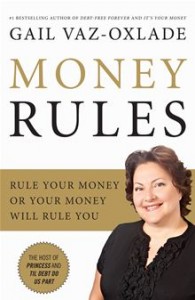Watch your food costs

“It’s not what we do once in a while that shapes our lives. It’s what we do consistently.” – Tony Robbins
Dealing with money can sometimes be difficult, complicated and tricky. Whether it’s because of its unfortunate similarity to math or because saving doesn’t excite our brains as much as spending, the truth is that money is one of those necessities of life that we just can’t avoid dealing with. The good news is that handling money well isn’t rocket science; the habits that allow us to be successful aren’t complicated they just need to be applied consistently.
 One book that reminded me of this recently is Gail Vaz-Oxlade’s latest book “Money Rules”. Jim wrote a post earlier this year about his favorite money rules and so I thought that, over the next few weeks, I’d share some that resonated with me.
One book that reminded me of this recently is Gail Vaz-Oxlade’s latest book “Money Rules”. Jim wrote a post earlier this year about his favorite money rules and so I thought that, over the next few weeks, I’d share some that resonated with me.
Money rule #239 – watch your food costs
I love this rule because I’m always looking for simple ways to cut spending in order to free up money that can be put to work to achieve savings goals. Food is definitely a necessity but a lot of the money we spend on food isn’t necessary. Simple strategies that help us fine-tune our spending can make a surprisingly large dent in our weekly food bill:
Plan ahead
Shopping with a list (and sticking to that list!) is a great way to keep your food costs in line. If you can plan meals ahead of time it makes it easier to create a list of all the groceries you need for the week and buy them all at once. By reducing the number of trips you need to make to the grocery store you’re also reducing the number of times you’re likely to be tempted into adding one of the weekly specials (conveniently located at the entrance of the store) to your cart. If you have a hard time sticking to your list, try going to the grocery store with only enough cash to pay for everything you need and leave your debit/credit cards at home. Not only will you not overspend but you’ll start paying closer attention to the store prices and be better able to recognize a bargain when you see one. Taking the time to go through the store flyers and check the special offers can also save you a lot; try to buy the items you use often when they’re on sale and take advantage of the fact that many grocery stores will price match other stores’ offers so you can get the sale price without making an extra trip to a different store.
Choose your treats
One of my co-workers claims that he only ever shops around the edges of the grocery store because that’s where the “real food” is. I’m not convinced I can find everything I like to eat without venturing into the aisles but it’s definitely true that snacks, pop and convenience foods can dramatically increase your grocery bill. Cutting back even a little on the amount of convenience food we buy at the grocery store can save us money and have a positive impact on our health too. This is equally true when it comes to takeout food and eating out; it’s not that we have to give up our treats completely but being aware of how much we’re spending gives us the power to choose to make small changes and repurpose some of that money to help us achieve our financial goals more quickly.
Define your latte factor
David Bach uses the phrase “latte factor” in his ‘Finish Rich’ series of books to define the amount of money we spend on coffee and snacks. It’s not that picking up a coffee on your way to work every day is a bad thing, it’s more than a small amount of money spent every day can add up to a significant sum. I’ve mentioned before that I like to meet with clients over coffee and that it was only when I started seriously tracking my spending that I realized how much that habit was costing me. I didn’t want to change the location of my meetings but by choosing to buy a $2 tea rather than a $5 latte I cut the cost of those meetings by more than 50%. I’ll still buy a latte once in a while but nowhere near as often and I don’t feel like I’m missing out. Small changes, such as buying coffee a couple of times a week instead of every day or making your drink of choice at home instead of buying it can have a big impact when it comes to freeing up cash to help you meet your goals.
Related article: The Latte Factor
When it comes to building wealth, it’s often the small changes that allow us to repurpose a few dollars here and there that have the biggest long-term impact. Why not take a look at your food spending this month and see if you can find some ways to repurpose some of the money and put it towards meeting your goals? If you’ve found creative ways to reduce your expenses, let me know, I’d love to hear them.
Comments
I hate shopping and I let the cupboards get pretty bare and end up getting take out or throwing whatever looks fast in to my cart at the supermarket without thought to price because I just want to get home after work.
I have no idea what the solution to this problem is. Resolv, a good plan It is a budget area I really need to work on.